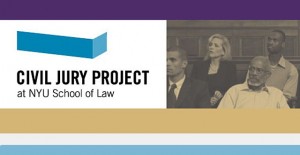Source of article DOAR Litigation Consulting.


Stephen Susman
In a series of articles on Law 360, Steve Susman, Richard Lorren Jolly and DOAR Jury Consultant Roy Futterman provide the Civil Jury Project’s proposed innovations for improved jury trials:
This is the ninth piece in a series of articles on the Civil Jury Project’s proposed innovations that can resuscitate the American jury trial. Each week, we offer a summary of a different innovation, the legal support for its use, and empirical studies on its popularity. Each innovation has been proposed by academics and practitioners, implemented by state and federal judges, and is not prohibited in most jurisdictions. Most importantly, each innovation addresses the main criticisms leveled at juries — that they are too long, too expensive, too unpredictable — and is designed to make trial by civil jury a more desirable form of dispute resolution.
Innovation Nine: Jury Discussion of Evidence Before Deliberation

Richard Lorren Jolly
Jurors spend inordinate amounts of trial time sitting in the jury room together waiting for the judge and attorneys to hash out issues. What if this down time were put to meaningful use?
While traditionally jurors have been instructed not to discuss the evidence before entering deliberations, some jurisdictions have allowed jurors to discuss the evidence as long as all jurors are present in the room and no vote or decision is made. The idea is to ensure more accurate fact-finding and juror comprehension, as well as to motivate jurors toward involvement in the trial. Jurors who discuss matters throughout the trial may recall evidence more readily when formal deliberations begin. Allowing the practice also makes for a more rewarding juror experience: Jurors do not view time spent meaningfully in the jury room as wasted.
Arizona has been at the forefront of this innovation. For over 25 years, the state has required that “jurors shall be instructed that they will be permitted to discuss the evidence among themselves in the jury room during recesses from trial when all are present, as long as they reserve judgment about the outcome of the case until deliberations commence.” Colorado, too, allows jurors to “discuss the evidence among themselves in the jury room when all jurors are present.” And North Dakota grants courts discretion in civil cases to “allow the jury to engage in pre-deliberation discussion. Some states, such as Georgia, which have not approved pre-deliberation discussions, have also not explicitly prohibited the practice.

Roy Futterman, Ph.D.
We are sure that many of our readers will think this innovation egregious, and conclude that these state rule makers are, in forensic terminology, nutty. Defense attorneys in particular may be concerned about discussions occurring before they have even put on their case. Indeed, a national survey conducted by the Civil Jury Project and the American Society of Trial Consultants found that concerns over premature verdicts were the most common objection to this practice. Other objections were that it would cause undue confusion and waste time. To be sure, allowing jurors to discuss evidence before final deliberations proved to be among the least popular of our recommended innovations.
Empirical evidence belies these fears. The Arizona Jury Project, for instance, found that 89 percent of juries that were instructed that they could discuss the evidence in the case before deliberation chose to do so. And data shows that those jurors who have been allowed to engage in interim discussions, but have been instructed not to make any final decisions until final deliberations, follow the instruction. This suggests that the jurors want to both engage with each other, yet realize the importance of providing fairness.
Numerous studies, like this one for instance, have found no significant difference between those jurors permitted and those prohibited from discussing evidence as to when during the course of the trial they started to solidify their decision of who should win the case. Research participants in mock trials are routinely observed changing their opinions throughout the case presentations, particularly as to how their views of the actions of the parties in the case fit within the law they learn from the jury instructions and verdict form. In fact, the early part of deliberations usually involves a venting of emotions about the case and a gathering of consensus about the case facts before moving on to overall opinions as to the verdict questions.
Next week, we will conclude this series by collating the motivations behind the previous nine innovations, and the Civil Jury Project’s overriding theory that it is relatively easy to have better informed jurors that would make the jury trial a more desirable form of dispute resolution.
Stephen D. Susman is a founder of Susman Godfrey LLP and the executive director for The Civil Jury Project at NYU School of Law.
Richard Loren Jolly is an attorney and research fellow at the Civil Jury Project.
Roy Futterman, Ph.D. is an adviser to the Civil Jury Project. He is a jury consultant, clinical psychologist and director at DOAR, Inc., as well as a columnist for Law360.
The post Innovating For Wise Juries: Discussions Before Deliberations appeared first on DOAR.
